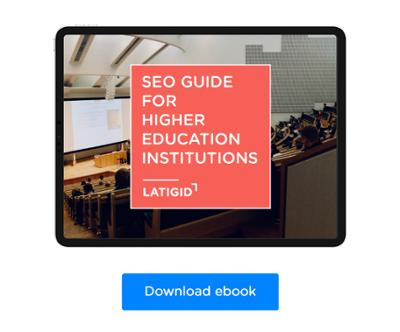
Competitor analysis goes beyond simply understanding who your competitors are; it involves a comprehensive examination of their strategies, tactics, and online presence. By studying and analyzing your competitors, you gain valuable insights that can inform and enhance your own SEO efforts. In the realm of higher education, where competition for students is fierce, having a deep understanding of what your rivals are doing online can give you a significant advantage.
By the end of this article, you will understand why competitor analysis is a crucial component of any higher education SEO strategy and how it can help your institution stay ahead in the digital landscape. So, let's dive in and discover the power of competitor analysis in elevating your online presence and attracting prospective students.
Related article: How University's investment in SEO will boost enrollment?
What is SEO and why is it important for higher education institutions?
Search Engine Optimization (SEO) is the practice of optimizing a website's visibility and ranking in search engine results pages (SERPs). It involves implementing various strategies and techniques to improve a website's organic (non-paid) search engine performance. While SEO is crucial for businesses in various industries, it holds particular significance for higher education institutions. Here are a few reasons why SEO is essential for higher education institutions:
Increased Visibility
SEO helps higher education institutions rank higher in search engine results, improving their visibility and exposure to potential students. Higher rankings lead to increased organic traffic to the institution's website, making it more likely for prospective students to discover and explore the offerings.
Enhanced User Experience
SEO involves optimizing various elements of a website, such as its structure, navigation, and content, to provide a seamless user experience. A well-optimized website loads quickly, is mobile-friendly, and offers relevant and informative content, making it easier for visitors to find what they are looking for and navigate through the site.
Targeted Traffic
SEO allows institutions to target specific keywords and phrases relevant to their programs and offerings. By optimizing their website for these keywords, they attract highly targeted traffic—prospective students actively searching for the exact programs and courses they provide. This targeted traffic increases the likelihood of attracting qualified leads and potential applicants.
Competing in a Crowded Space
The higher education landscape is highly competitive, with numerous institutions vying for the attention of prospective students. SEO provides a competitive edge by helping institutions stand out from the crowd. By optimizing their website, institutions can differentiate themselves, highlight their unique offerings, and showcase their strengths to attract and engage potential students.
Long-Term Sustainability
Unlike paid advertising campaigns, which require continuous investment, SEO offers long-term sustainability. By consistently optimizing their website and following SEO best practices, higher education institutions can build a strong online presence that continues to generate organic traffic and leads over time. This sustainable approach ensures a lasting impact and a steady stream of prospective students.
Related article: SEO for Higher Education: Metrics and Tools to Track Performance
Why do you need competitor analysis to improve SEO?
Competitor analysis is an integral part of improving SEO because it provides valuable insights and opportunities for optimization. Here are several reasons why competitor analysis is essential in the quest to enhance SEO:
Identify Competitor Strategies
Competitor analysis allows you to gain a deeper understanding of what strategies and tactics your competitors are employing to achieve their SEO success. By studying their approaches, you can identify effective techniques, learn from their experiences, and adapt their successful strategies to improve your own SEO efforts.
Discover Keyword Opportunities
Analyzing competitors' keyword strategies can reveal valuable opportunities that you may have overlooked. By identifying the keywords and phrases your competitors are ranking for, you can uncover new keywords to target or find gaps in the market that you can exploit. This information enables you to optimize your content and target relevant keywords to drive more organic traffic.
Uncover Content Gaps
Examining your competitors' content can help you identify gaps in your own content strategy. By understanding what topics and types of content resonate well with your target audience, you can develop more comprehensive and engaging content that fills those gaps. This approach enhances your website's authority and relevance, leading to improved search engine rankings.
Analyze Backlink Profiles
Backlinks are a critical factor in SEO success. Through competitor analysis, you can evaluate the backlink profiles of your competitors and discover potential link building opportunities. By identifying websites that link to your competitors but not to your own site, you can devise strategies to acquire similar high-quality backlinks, ultimately strengthening your website's authority and visibility in search engine results.
Track Competitor Performance
Monitoring your competitors' SEO performance is essential to gauge their success and stay ahead of the competition. By tracking their rankings, organic traffic, and other metrics, you can identify trends, adapt your strategies accordingly, and seize opportunities as they arise. Additionally, understanding your competitors' performance helps you benchmark your own progress and set realistic goals for improvement.
Stay Updated with Industry Trends
Competitor analysis keeps you informed about the latest trends and innovations in your industry. By monitoring your competitors' websites, content, and online presence, you can identify emerging strategies, new technologies, and shifting consumer preferences. This knowledge allows you to stay relevant and make proactive adjustments to your SEO strategy to maintain a competitive edge.
Check this article made by Semrush: How to Do an SEO Competitor Analysis
In summary, competitor analysis is essential for improving SEO because it provides insights into competitor strategies, uncovers keyword and content opportunities, helps build a strong backlink profile, enables performance benchmarking, and keeps you informed about industry trends. By leveraging these insights, you can refine your SEO approach, optimize your website, and achieve better search engine rankings, ultimately driving more organic traffic and improving your online visibility.
LATIGID
We are a Higher Education Marketing Agency, specialized in SEO. We help you grow by increasing website traffic, generating more student leads and closing those leads into enrollment. With a deep understanding of the latest industry trends and best practices, we are well equipped to help your institution grow.
If you are looking for a Higher Education Marketing Agency to partner with, check our page to see what we can do for you!
Download our SEO guide and learn how to build a strategy to optimize your Higher Education Institution's website




